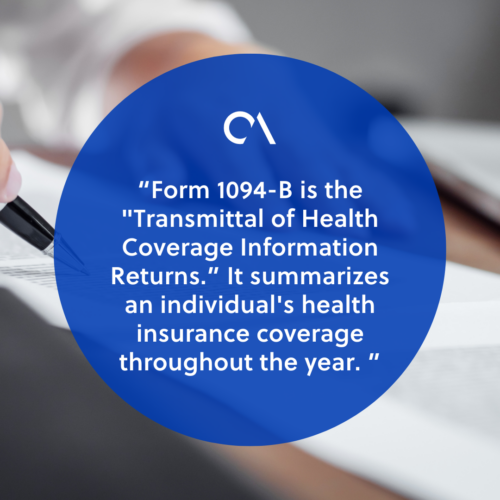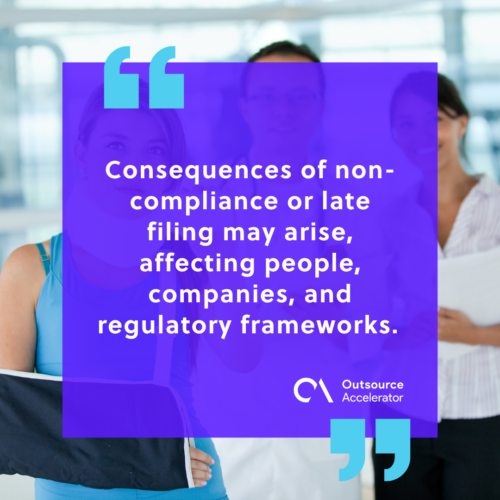Form 1094-B: Your guide to smooth tax filing

The Internal Revenue Service (IRS) receives information about Minimum Essential Coverage (MEC) through Form 1094-B.
This crucial document is your ticket to correctly reporting health coverage data and a smooth tax filing experience.
You can rely on Form 1094-B to make sense of your tax obligations and provide the information you need for a productive filing season.
What is Form 1094-B?
Form 1094-B is the “Transmittal of Health Coverage Information Returns.” It summarizes an individual’s health insurance coverage throughout the year.
This document also accompanies Form 1095-B, provided to the taxpayer by their health insurance provider. It offers a snapshot of the individual’s health coverage in compliance with the Affordable Care Act (ACA) requirements.
Who is required to file Form 1094-B?
Health insurance providers are required to file Form 1094-B. These providers include:
- Government agencies
- Employers with self-insured plans
- Other organizations offering minimum essential coverage
This holds true regardless of whether the coverage is offered by government-sponsored initiatives or conventional insurance.

When to file Form 1094-B?
Form 1094-B filing deadlines must be met to guarantee a seamless tax filing procedure.
If submitting on paper, providers must send the form to the IRS by the end of February or by the end of March if filing electronically.
These deadlines enable the IRS to accurately determine tax credits and penalties associated with health coverage by cross-referencing the data on Form 1094-B with individual tax returns.
Components of Form 1094-B
Form 1094-B’s crucial elements include the filer’s details, the number of covered individuals, and other pertinent information required for accurate reporting.
Complying with healthcare reporting regulations requires an understanding of these elements:
Part I: Information about the Responsible Individual
The individual in charge of providing health coverage must be identified to complete this section. It can be the employer, an insurer, or another organization.
A designated contact for handling issues about the reported health coverage is ensured by providing their name, address, and taxpayer identification number.
Part II: Information about Health Coverage
The IRS uses health coverage data to assess whether or not people have complied with the Affordable Care Act’s minimum essential coverage requirements.
This section contains essential information such as the insured’s names and social security numbers, the coverage duration, and the type of coverage offered.
Part III: Administrative Details and Signatures
The administrative entity’s responsibility is to ensure the submitted form’s accuracy and completeness, typically the employer or the health coverage provider.
In this instance, the report’s author must vouch for accuracy and provide necessary explanations or justifications.
Signing the document is a crucial reporting step because it attests to the accuracy of the information.
Exemptions to filing Form 1094-B
The insurer’s or the provider’s obligation is to file Form 1094-B for those who have independently purchased health insurance.
Here we have a list of exemptions and exceptions when filing the form:
Organizations with government programs
Coverage is typically exempt from individual reporting under minimum essential coverage, which includes government programs and employer-sponsored plans.
Form 1094-B filing is typically waived for organizations participating in government programs like Medicare, Medicaid, and CHIP. These initiatives have their reporting requirements.
Companies with less tha 50 workforce
Companies offering self-insured health coverage and employing fewer than 50 people full-time may also qualify for an exemption. To avoid needless paperwork, small employers should carefully evaluate their eligibility.
Particular coverage types
Certain coverage types, such as plans that only cover dental or vision care, might not be required to submit reports. Determining eligibility requires an understanding of the type of coverage offered.
Consequences of non-compliance or late filing
Consequences of non-compliance or late filing may arise, affecting people, companies, and regulatory frameworks.
It is possible to incur financial penalties, legal consequences, and reputational harm by disregarding established guidelines.

Penalties and fines
Giving false information on Form 1094-B or submitting it after the deadline can result in penalties.
The IRS takes non-compliance seriously and penalizes organizations that do not meet their reporting requirements. To prevent these financial repercussions, all of the information must be verified.
Inaccurate form submission costs $290 per form. If recipient forms are not provided, each form is $290. When asked to do so, every form that is not electronically filed costs $290.
Misleading information
Misunderstandings and clarity can result from accurate reporting. If the IRS learns of false information, it may purposefully begin audits or investigations into an entity’s compliance.
Ensuring the data submitted is precise and accurately reflects the coverage state is mandatory.
Impact on individuals
Noncompliance may have direct negative effects on individuals. If the coverage information is not reported accurately, they might face issues when filing their taxes.
This could delay receiving tax credits or even higher tax obligations.
This form is the basis of the ACA reporting process. It facilitates accurate record-keeping for insurance companies and the IRS and easier monitoring of healthcare coverage for taxation purposes.
Understanding and accurately completing Form 1094-B is mandated by law and an essential first step in promoting transparency and accountability in the healthcare industry.







 Independent
Independent




